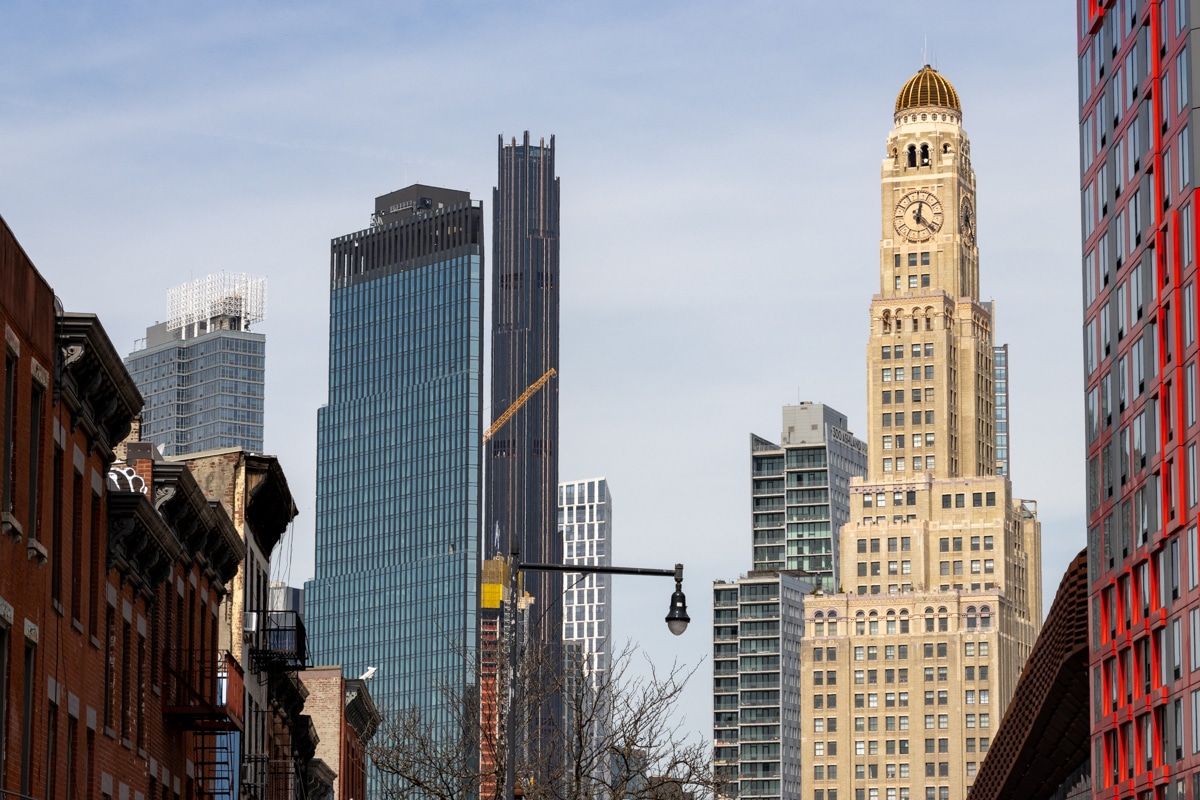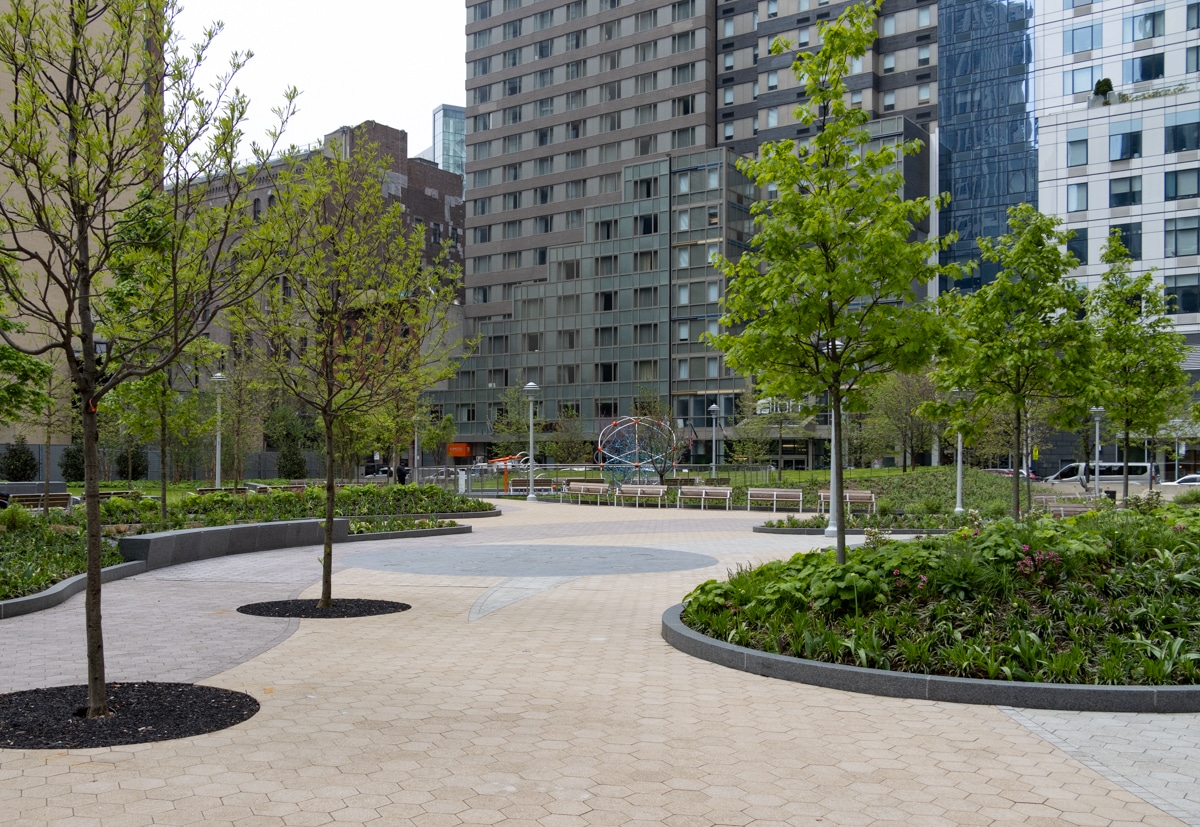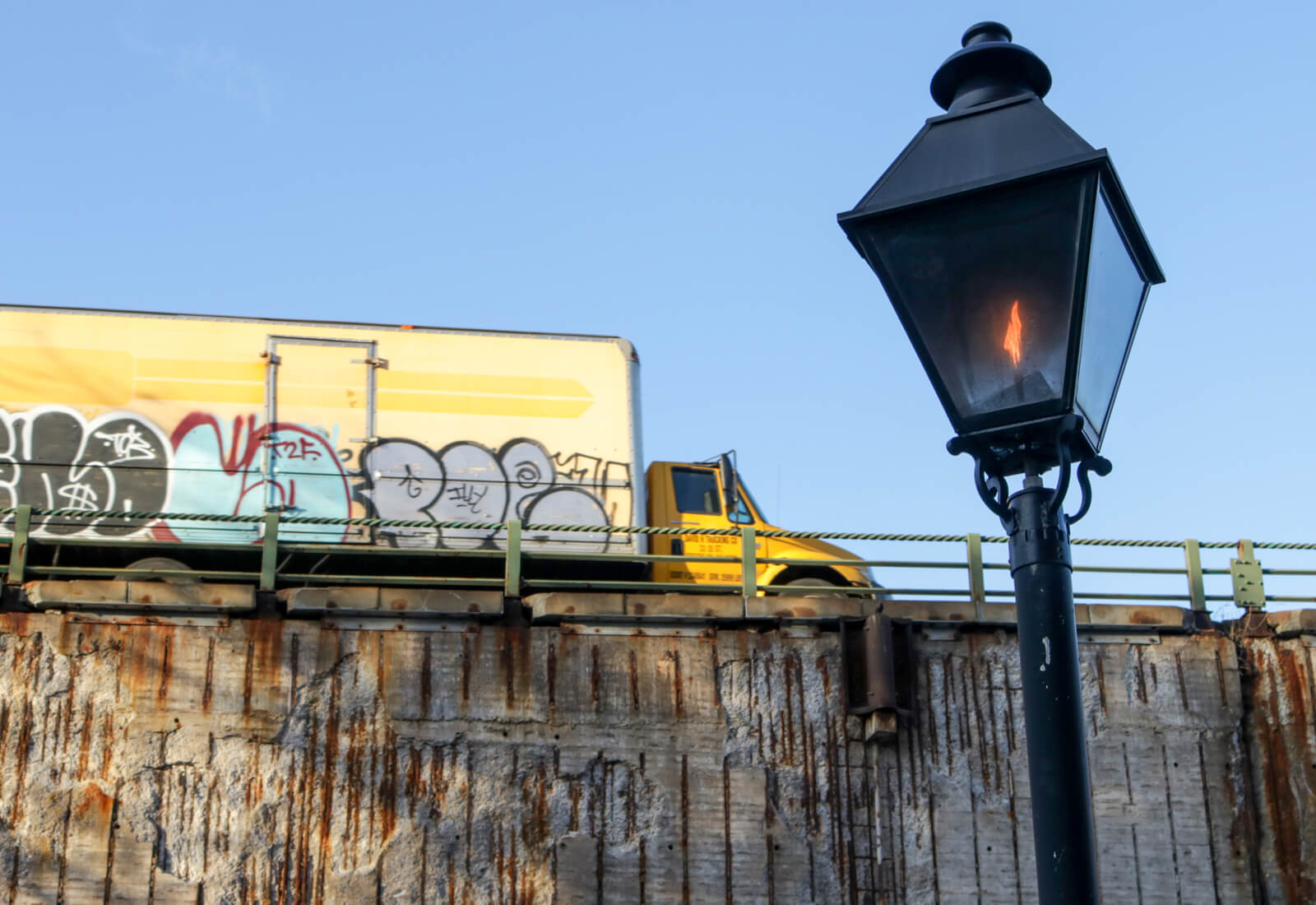‘Co-Living’ Landlords Turned $800 Rent-Stabilized Apartments Into $7,000 Suites. Now Tenants Are Pushing Back
Outpost Club promises hassle-free, low-commitment entree into Bushwick, Ridgewood and other trendy neighborhoods. Some residents are on rent strike and demanding their apartments get their regulated status restored.

A young person with a suitcase walks by Outpost Club tenement building in Bed Stuy, Brooklyn. Photo by Ben Fractenberg/THE CITY
Sam Rabiyah and Suhail Bhat, The City
This article was originally published on by THE CITY
The “co-living” company Outpost Club lures would-be residents to its properties with a dreamy vision of NYC living coveted by young transplants. In some of the city’s trendiest neighborhoods, you can enjoy luxury amenities with a global “community” of professionals, all while taking advantage of special “rental financing solutions” and speedy move-ins for as little as one month into rooms with shared common areas.
“Experience what feels like a beautiful celebration of culture just walking down the street, listening to the languages being spoken while deciding which food cart to stop at,” reads the listing for one residence, the “Maison on Suydam” in Bushwick.
Beneath the veneer, landlords that Outpost works with are exploiting one of the few remaining ways available to remove apartments from New York’s rent-stabilization system, after a 2019 law prohibited deregulation in all but a few instances.
By clearing out and then renovating buildings, owners can assert they have performed “substantial rehabilitation” and claim the right to deregulate the apartments. Outpost then rents them out room by room on the owners’ behalf.
THE CITY found a history of rent regulation in 11 of Outpost’s 30 buildings.
One three-bedroom rent-stabilized Bushwick apartment with a legal rent of $800 a month in 2021 is now a set of three “maisonette” suites, each with their own bathroom, collectively raking in $7,000 monthly.
Founded in 2016 and featured in The New York Times last year, Outpost Club operates almost exclusively in historically Black, brown and immigrant — and rapidly gentrifying — areas of the city.
Most are clustered in Bed Stuy and Bushwick in Brooklyn, and Ridgewood in Queens. “It’s a cool vibe over there. Many new places, new coffee shops,” Sergii Starostin, CEO of Outpost Club, told THE CITY in a video interview.
THE CITY talked to 10 tenants living in Outpost Club buildings across three boroughs, who say they have experienced a different reality than the one advertised. They complain of cockroach infestations, leaking roofs and heat outages. When they take up those issues with management, they are met with radio silence.
While many residents come and go, a group of tenants in Bed Stuy is looking to stay and has taken matters into their own hands.
Their tenant association, which counts half the building’s residents as members, is now on month six of a rent strike, withholding all payment until Outpost fixes maintenance problems that include a mice infestation and a front door that doesn’t close. They are also demanding the rent-stabilized leases they believe they are entitled to, given their building’s history.
“The rent-stabilization thing, that’s the whole thing that we’re fighting about,” said Dani S., an Outpost tenant organizing at 662 Madison Street in Bed Stuy, who asked that her full name not be published. She said they had asked for, but not received, any credible documentation of how exactly their building exited rent regulation, which happened under a previous owner. “We’ve given them so many chances. We’re still waiting.”
Said Starostin: “I passed these concerns on to the landlord.” He asserted that Outpost is not responsible for handling documentation with government agencies. “My job is to take information, pass it along. I don’t make decisions over there.”
Starostin asserted that Outpost doesn’t own any buildings and is not involved in renovations but rather acts as an “agent” responsible for their upkeep for which it collects a certain management fee.
For three Outpost-managed buildings, THE CITY obtained letters their owners addressed to the state housing agency documenting their intent to “substantially rehabilitate” the buildings: empty all apartments one by one, holding vacant units until all are cleared, then rebuild 75 percent or more of the structures.
Substantial rehabilitation is one of the last remaining legal ways to deregulate buildings following the 2019 rent laws. Landlords have formally reported more than 10,000 substantial rehab deregulations since 1994, as tallied by the city Rent Guidelines Board, but reporting these exits is voluntary for landlords.
Tenant advocates suspect that informal substantial rehabs could partly explain why the state’s official count of regulated apartments has dropped by tens of thousands since 2019. An unsigned bill currently on Governor Kathy Hochul’s desk would require registration and tracking of those units.
The conversion of rent-stabilized buildings into group residences has been disruptive to longtime residents.
EJ, who asked to be identified only by his first name, had lived for 35 years at the building now known as Maison on Suydam. He claims he was “harassed out” in 2021, as maintenance needs went unaddressed and a parade of prospective buyers tried to coerce him to leave.
“That’s the typical thing in Brooklyn now anyway, they try and get you out,” said EJ.
Outpost Club is one of dozens of independent companies that offer medium-term rentals, catering to interns, students, and others who need a spot in the city for a few months — and need one quickly.
/cdn.vox-cdn.com/uploads/chorus_asset/file/24850004/072723_outpost_stuy_heights_2.jpg)
Even as short-term rentals of less than 30 days on Airbnb and similar platforms are about to be subject to strict new registration requirements that go into effect September 5, co-living is a largely unrestricted industry that remains a lucrative way for property owners to maximize revenue from New York City apartments.
THE CITY counted at least 2,500 building addresses, amounting to tens of thousands of single rooms, on nine popular co-living and medium-term rental websites, including Common, Coliving.com, June Homes and Blueground. Nearly all of these companies offer individual rooms within multi-bedroom apartments, enabling property owners to yield revenue significantly higher than a single household would pay to rent the entire apartment.
“It’s a particular market. It’s about the single professional. This is what gentrification itself is geared to,” said Imani Henry, with the tenant group Equality for Flatbush. “The vast majority of people on the planet do not live like that, mothers, babies, children be damned.”
‘Raining Into My Room’
On Suydam Street near the Bushwick-Ridgewood border in Brooklyn, one row house stands out among a string of three-story limestone buildings, with new black light sconces and a touchscreen doorbell. When THE CITY rang an apartment on the third floor, the tenant received the call at the beach in Rhode Island.
This building is the Maison on Suydam, from Outpost Club’s signature Maison property brand, with rooms curated by an in-house interior designer to feel like a “mix between your bedroom and a hotel.”
Current rents are $2,470 per month, plus a $149 utility fee, for a bedroom and bath inside an apartment, according to an offer Outpost gave a prospective tenant in July that THE CITY reviewed.
Fabian Lux, a physics postdoctoral student at Yeshiva University who moved to Brooklyn from Germany last November, was keen on finding a quick and temporary place to live, and Outpost seemed to be the most legitimate-looking option.
“Even The New York Times wrote about Outpost, which gives them a bit of credibility,” Lux told THE CITY, noting that he paid a security deposit for his first-floor apartment before he could even visit, a typical “first leap of faith you have to do,” he claims, to secure a spot in the building.
The other tenants in the building are a lot like him, he says — foreigners arriving in the city for the first time doing short-term work. Before long, he noticed some major issues going unaddressed.
The “tenant above me, when he takes a long shower, at some point there is water raining into my room,” Lux recounted. He claims he was encouraged by management to talk to the offsite “house leader” about repair issues instead of contacting the landlord or calling 311 for a city housing inspector.
“This kind of bypasses the official system for reporting a maintenance issue. And then nothing happens,” he said.
Starostin told THE CITY that Outpost does its best to handle such complaints. “We try to be advocates for both sides, for the tenant sides and for the landlord side and find some kind of middle ground,” he said.
Said Maison on Suydam landlord Albert Dweck: “I visit the properties often myself and ensure that our residents and communities are being well taken care of.”
Elizabeth, who asked that her full name not be published, was one of the first tenants to move into the Maison on Suydam after its renovation in 2022, paying close to $2,000 per month for her room and bath.
On a day in June earlier this year, she received a mysterious letter from the state’s Division of Housing and Community Renewal. It was her apartment’s rent history, and it specified that the previous family to live in her three-bedroom suite held a rent-stabilized lease from 2021 to 2022 — and paid $800 a month.
She said she has no idea who ordered the rent document, which can only be requested by a tenant.
All four Maisons — the other three are in Bed Stuy, Ridgewood and Washington Heights — are owned by Duke Properties, which bought these buildings through limited liability corporations between January and May 2021 for a combined $10.5 million, deeds and property tax bills show. Outpost is managing at least eight properties owned by Duke, whose founder and CEO Albert Dweck owns nearly three dozen buildings that include rent-stabilized apartments.
“Most of the buildings we buy are over 80 years old and are in substandard condition and are in need of Substantial Rehabilitation. We diligently follow the rent stabilization laws and building codes in order to produce good, safe, quality housing that people can enjoy,” Dweck wrote to THE CITY, in response to a list of questions.
“Our rent structure is in line with the guidelines set forth and the quality of properties we maintain,” Dweck added.
Two other Outpost buildings are owned by an affiliate of Oved Group, founded by Isaac Oved. Its chief investment officer, Ezra Dweck, previously worked at Duke Properties.
“Looking to purchase vacant multi-family buildings in gentrifying neighborhoods in Brooklyn and Queens. Please reply or message me if you have anything relevant,” Ezra Dweck wrote on LinkedIn in 2017, while he worked at Duke Properties.
In both the Maison on Suydam and the nearby Maison on Linden, Albert Dweck submitted with his construction permit applications letters of intent to substantially rehabilitate what he asserted were vacant properties at both locations.
THE CITY previously reported that Ridgewood and Bushwick in particular saw a large drop-off in registered rent-stabilized units after 2019, and that substantial rehabilitations of buildings was a likely reason.
“The neighborhood has changed drastically. It used to be families living in these places, and there were affordable rents, and people were enjoying their lives,” said EJ, who moved into the first floor of the Suydam Street building in 1986 and left when Duke Properties took it over. “Now New York is full of people who just want to come and live for a little and split,” he said. “The landlords, they got hip to that idea and they said, ‘Hell, we’ll change things.’”
EJ knew the family that owned his building, who lived on the third floor. He recounted that when the older members of the family passed away, their children wanted to sell the building and tried to “kick everyone out.”
“It was bad at the end, and these people just wanted everybody just to leave,” said EJ of the prospective buyers who toured his apartment. THE CITY reached out to EJ’s landlord at the time but didn’t receive a response.
EJ moved out in 2021 but still frequents the neighborhood.
“I had a beautiful garden in that backyard,” said EJ. “It’s really horrible what’s happening there.”
“Sometimes, when they move in, it’s true that some amenities were not available, but all the tenants got a discount for that. It was the landlord delaying the amenities,” said Starostin.
In the weeks leading up to the sale of the Suydam Street building, city records show a spike in 311 complaints from tenants living in the building, as well as 10 “hazardous” or “immediately hazardous” code violations for cockroach and mice infestations, water leaks, and defective fire suppression plaster.
“Four units will be vacant on title,” read a Redfin post advertising the “large semi detached 6 family rent-stabilized brick home” for sale in spring 2021. Dweck bought the building for less than $1.3 million in May 2021.
Once converted, the co-living residences are no longer accessible to many area residents, and not just because they are aimed at single young professionals.
Steph Rudolph, a Legal Aid staff lawyer who reviewed Outpost lease contracts obtained by THE CITY, warned that the leases clash with the rules of widely used housing subsidy programs for low-income people, such as the federal Section 8 program.
“Outpost has — whether intentionally or not — excluded an entire protected class of renters from any property they lease in this manner,” Rudolph said. “Not only do these terms feel unconscionably unfair, but the structure of these leases violates New York City and New York state human rights laws.”
Outpost CEO Starostin said he welcomes government changing policy to make co-living and Section 8 regulations compatible.
“We recognize and agree that Section 8 benefits are an important tool in providing affordable housing, and we would appreciate any assistance our elected officials could provide in bridging those gaps which might prevent Section 8 beneficiaries from participating in our co-living community,” he said in a statement to THE CITY.
Assigned Roommates
Marie-Louise spent a year living in an Outpost building in Harlem. She was attracted by the ease of moving in, and quickly needed to exit a toxic living situation.
She had lived in the city for over a decade and knew, from online reviews, that other residents had had complaints. “But I was desperate to move in somewhere because I didn’t have anything else,” Marie-Louise said.
Owned by Duke Properties, the building on West 138th Street was managed at the time by Common, another NYC-based co-living company.
/cdn.vox-cdn.com/uploads/chorus_asset/file/24850442/081423_outpost_harlem_2.jpg)
Marie-Louise didn’t have enough money in her bank account to pay the security deposit, but she needed to move in before her next payday at work. So Common set her up with an account on Obligo — a “third party guarantor” app that offers a payment plan for security deposits and pre-authorizes a hefty charge to a credit card. Marie-Louise still had to pay a $634 upfront fee, and signed on to pay an additional $53 per month.
She authorized a $3,726 charge on the app — three months’ rent — that the landlord could claim for damages to the apartment or anything considered a lease violation.
“It was like a loophole to get young people like me to come there.”
Marie-Louise, who asked that her full name not be published, paid the fees and moved into the Clark House in May 2021, occupying a 99-square-foot room in a shared three-bedroom co-living unit. Soon Outpost Club took over.
Her lease with Common contained an unusual provision. She had to sign away her right to know the identities of her roommates — while also being liable for their obligations to pay rent and maintain the space. A current lease at the Maison on Suydam contained a nearly identical clause.
“It felt really weird,” Marie-Louise said.
Also strange to her: her bedroom came without a lock, even though she was living with strangers. The reason is that 125 West 138th Street is certified for occupancy as an apartment building, not a single room occupancy hotel, and apartments are forbidden by law from having key locks on interior doors.
Throughout Marie-Louise’s year at the Clark, maintenance issues were constant, she said, including a mice infestation and a roof that leaked water whenever it rained — consistent with housing violations issued by the city during this time period. She moved out in June 2022 after her one-year lease ended.
Not long before Marie-Louise moved in, the building was registered as rent stabilized, state records show.
Duke Properties purchased the building in February 2020. That fall, Albert Dweck obtained a permit to renovate nine of the building’s 10 apartments, with no change to internal building systems. Around this time, the Department of Buildings received over 20 complaints. One read: “ILLEGAL CONSTRUCTION AND DEMOLITION GOING ON, THIS IS A 5 STORY BUILDING WITH ONLY ONE TENANT.”
Another complaint: “THIS IS NOT A MINOR WORK, THEY ARE DEREGULATING THE BUILDING.” DOB inspectors reported back that they were unable to gain access to the building.
Today, Outpost advertises 16 rooms on Airbnb at the Clark House offering minimum 30-day rentals for about $2,000 per month for each room, with shared bath.
Starostin says tenants need to be realistic about what to expect.
“There are zero properties in New York City that have zero problems,” he said. “I always make sure that my teams are addressing the issues, and not pretending to address the issues.”
Marie-Louise still expresses bitterness about the experience. “People don’t deserve to get sucked into this,” she said. “I can’t believe they are still running the place.”
‘We Are Not the Enemy’
The rent strike by tenants in three out of eight apartments at the Stuyvesant Heights House on Madison Street in Brooklyn is now in its sixth month.
“When I moved in, the roach infestation was one of the first things I noticed,” says Dani S., a tenant in 4R who moved to Brooklyn in September 2020, landing a spot at 662 Madison.
“It was so bad to the point where we had to clear out our entire kitchen, put everything in tubs,” says Alley B., a roommate of Dani’s who moved in shortly after her. Outpost sent an exterminator to the apartment, but the tenants say they did not see results. “The guy would just spray like a corner and then walk away,” said Alley.
/cdn.vox-cdn.com/uploads/chorus_asset/file/24849999/072723_outpost_stuy_heights_1.jpg)
Since Dani arrived, city inspectors have issued 30 housing maintenance code violations. Of those, 13 violations are still unresolved — including five for mice and cockroach infestations and several related to water leaks and mold. City inspectors classified all but one of these open violations as “hazardous” or “immediately hazardous.”
In 2021, a city Department of Buildings inspector wrote up the building for thousands of dollars in fines, alleging that the building had been illegally converted into a single room occupancy residence with rooms offered on Airbnb. A city administrative judge sided with DOB and ruled against 662 Madison Ice LLC.
The landlord appealed, and got most violations dismissed in July 2022, after the Department of Buildings failed to respond to the appeal. The judge concluded that the apartments were not illegal conversions because “none of the bedroom doors had key-locking devices.” The city tribunal upheld a $6,250 fine for failing to operate the building in a safe and code-compliant manner.
Weeks later, Outpost Club proposed a 35% rent increase for Apartment 4R — raising rent for the four rooms combined from $3,400 to $4,590 a month.
“With roaches everywhere and a slew of other issues, we were also going through the negotiation of our rent,” said Natalie R., a native New Yorker who is Dani’s other roommate.
Natalie, who was in touch with a local tenant group, requested the apartment’s rent history out of curiosity — only to find that the apartment had registered as stabilized in 2014 with a legal rent set at about $950. So, the 4R tenants began to organize with their neighbors and form a tenant association.
The tenants wielded this rent history as they negotiated their rent increase down to only a few percentage points — but Outpost refused to acknowledge the possibility that their apartment was still rent-stabilized.
“The property and all apartments are destabilized. There is no requirement for landlords to register substantial rehabilitation work to HCR, notifications to the agency are in effect a voluntary process,” read a March 3 email from Outpost to the tenants.
“We are not the enemy you are searching for.”
A few weeks later, Outpost Club forwarded the tenant association a document. Headed “Affidavit of Owner,” it is signed by Mendel Gold and dated August 2, 2022. The affidavit swears Gold is the current owner, that he purchased 662 Madison in 2018, and that he hired an architect to perform a “complete renovation” at a time where the building was completely vacant.
But property records show that Gold sold the property in 2018 to 662 Madison Ice LLC, an entity tied to the Oved Group and its affiliate IceCap Group.
“That’s probably a forged document,” said Joe Sutton, who identified himself as an employee of Ice Properties and responded to THE CITY’s questions about 662 Madison. According to Sutton, the landlord had no knowledge of the existence of such an affidavit.
Outpost CEO Starostin provided THE CITY with a PDF of an email IceCap sent him on March 3 which showed an icon for an attachment named “Affidavit of Owner.”
“Any piece of information or document can only be originated from the landlord,” Starostin told THE CITY, in response to a question about the validity of the document.
Acknowledging the rent strike, Sutton asserted that the property was legally deregulated through a substantial rehabilitation in 2014 and that he had the documentation to prove it. But when THE CITY asked to review the records, Sutton declined, saying it would be “inappropriate.”
Also attached in Outpost’s March email to the Madison Street tenants was a building permit application from 2014 to perform interior renovations, with an estimated total cost of $784,000. Beyond interior renovation, the permit only authorized plumbing work.
Gold has a documented record of removing rent-stabilized apartments from regulation.
On April 29, the tenant association sent its last email, addressed to Starostin. “Firstly and most importantly, we demand that you acknowledge and register the building as Rent Stabilized, as we believe this will help to ensure that we are receiving fair treatment and proper maintenance of our units,” the email says. It also lists demands around pest control and unresolved maintenance issues.
Since then, the tenant association members have withheld all rent payments. As is customary with upcoming eviction cases, tenants of 4R received a “14-day notice” demanding unpaid rent in June from lawyers for 662 Madison Ice LLC.
Two months since that notice, the landlord has still not initiated a legal case against the rent-striking tenants of 4R. The tenants keep the legal notice pinned to their fridge as they await the landlord’s next move.
“We’re fighting to be here. It’s exhausting,” says Natalie. “But they need to see that we know what’s up.”
THE CITY is an independent, nonprofit news outlet dedicated to hard-hitting reporting that serves the people of New York.
Editor’s note: A version of this story originally ran in Brooklyn Paper. Click here to see the original story.
Related Stories
- Bed Stuy Co-Living Debuts With Fun Furnished Digs Starting at $1,270 a Month
- Future Co-Living Space Rising on Busy Fulton Street Corner in Bed Stuy
- Brit Co-Living Startup Taps Hudson Yards Architect for 10 Stories on Bed Stuy’s Slave Theater Site
Email tips@brownstoner.com with further comments, questions or tips. Follow Brownstoner on Twitter and Instagram, and like us on Facebook.









What's Your Take? Leave a Comment